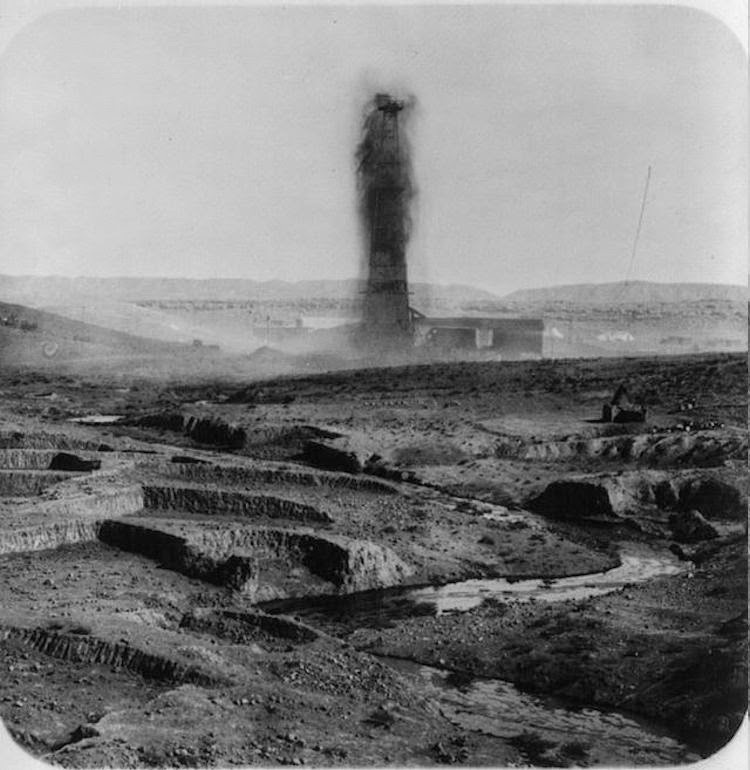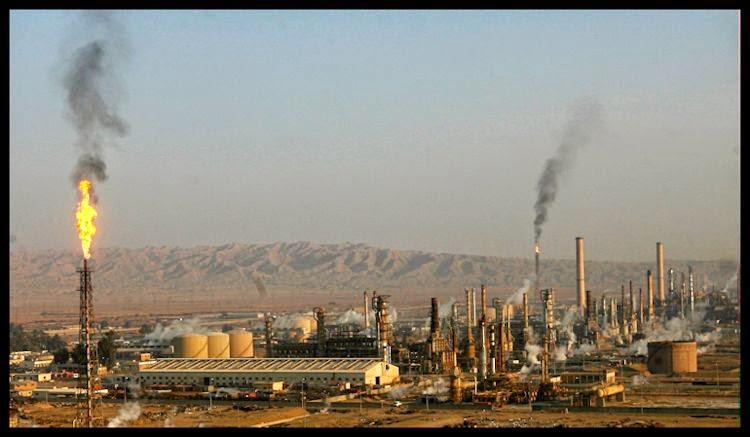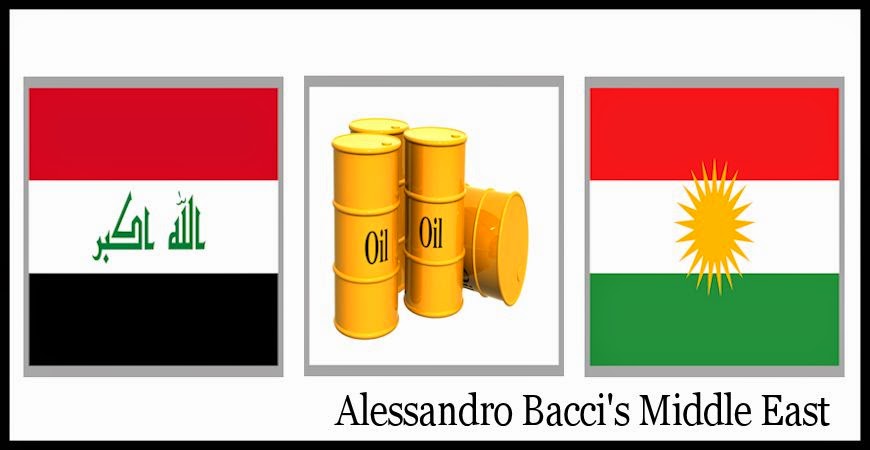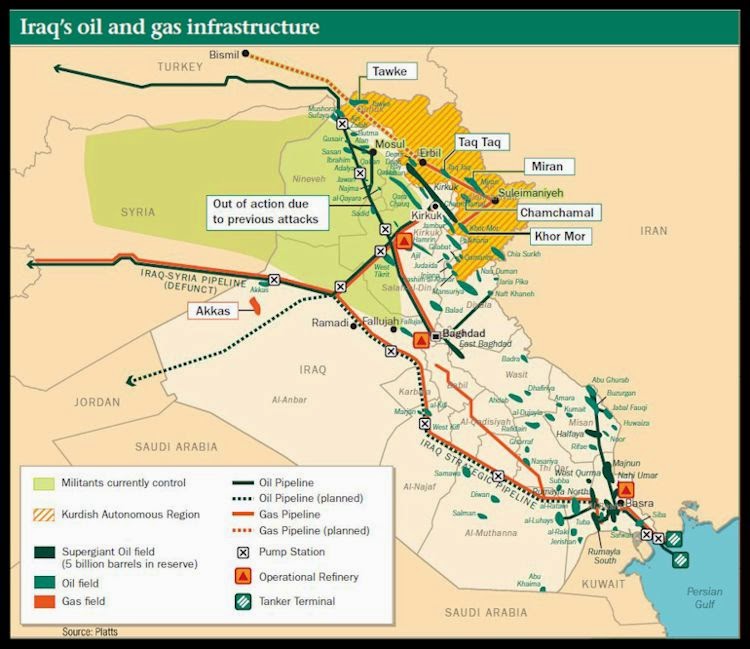December 18, 2014
BEIRUT, Lebanon — After three months of lengthy discussions,
at the beginning of December, the Kurdistan Regional Government (K.R.G.) and
Iraq's central government finalized a deal with reference to the distribution
of oil revenues in Iraq. An important breakthrough had already happened in
November when the two sides agreed on a couple of confidence-building gestures:
the K.R.G. provided to Iraq's State Organization for Marketing of Oil (SOMO), 150,000
barrels per day (bbl/d) of Kurdish oil at the city port of Ceyhan (Turkey) during
the final two weeks of November, and the central government made a onetime
payment of the value of $500 million to the K.R.G.
The final agreement, which will be implemented from January
2015, specifies that Baghdad will pay Erbil 17 percent of Iraq's national
budget as defined by the Iraqi Constitution, while Erbil will provide the
central government 250,000 bbl/d of Kurdish oil at Ceyhan for export. The money
received from the sales of the Kurdish oil will be deposited in an escrow
account in New York — until now the K.R.G. has deposited the money received
from its oil sales at Halkbank, the Turkish state bank. In addition, the K.R.G.
will also export via the newly built Kurdish pipeline 300,000 bbl/d of oil
extracted from the oil fields of the area around Kirkuk (Bai Hassan, Dubis and
Havana fields). These oil fields are under federal jurisdiction, but they
are currently under Kurdish control. In fact, last June, the Peshmerga forces
occupied Kirkuk in order to avoid that it could fall in the hands of the
Islamic State, the terrorist organization that now controls central and western
Iraq.
In total the K.R.G. will supply 550,000 bbl/d, which should
provide Baghdad with approximately a billion dollars per day. Technically,
shipping to Turkey via the same pipeline Kurdish crude oil (a blended medium
crude oil quality with gravity of 30 to 32 API degrees) and Kirkuk crude oil
(an average gravity of 36 API degrees) may be done only through batching in
order not to mix the two different qualities of crude oil. Apart from the
necessity of carrying out the batching of oil, another problem would be the infrastructural
gap of the present Kurdish oil pipeline, which would not be able to accommodate
so big a quantity of crude oil (the oil extracted from the K.R.G. and the
Kirkuk oil) unless additional pumping stations are added. But, in this regard,
in a conference in London, Minister of Natural Resources Ashti Hawrami of the
K.R.G. recently affirmed that the pipeline to Turkey would carry 500,000 bbl/d
by the end of the first quarter of next year and that during 2015 it could
carry 800,000 bbl/d including the 550,000 bbl/d to be market by SOMO.
 |
Iraqi Kurds Pipe Oil to Turkey — Map by
Lindsey Burrows
The American Interest (Dec. 2013) |
From Ceyhan, all of the barrels covered by the new agreement
will be exported by SOMO, although the Kurds initially demanded to market the
K.R.G. oil through the Kurdistan Oil Marketing Organization (KOMO). This
agreement will last for one year and could help Iraq draw Budget Law 2015 — in
this regard it is important to underline that until now the central government
has never approved Budget Law 2014 because of strong contrasts with Iraqi
Kurdistan.
As a corollary to the deal, until the end of 2014, the
K.R.G. will continue to provide SOMO with 150,000 bbl/d of Kurdish oil at
Ceyhan, and Baghdad will grant the K.R.G. another $500 million. The government
will also supply ground troops to support the Peshmerga forces in their fight
against the Islamic State in the Iraqi northern theater, and it will transfer
$100 million on a monthly basis for the salaries of the Peshmerga forces.
As a consequence of the deal, the companies operating in the
K.R.G. will receive more money. In Iraqi Kurdistan, the companies extract oil
and then the government sells it. The companies were owned almost $2.87 billion
up to last November (both in cash and bartered goods); in general until now they
have received only a small fraction of the due amount. Without at least
increased payments from Erbil, it is difficult for the foreign companies to
boost their operations in the K.R.G. For instance, in November, Gulf Keystone
Petroleum, a company registered in Bermuda, still was owned $250 million for
its activity.
It is difficult to evaluate this deal, which, as above
highlighted, will have duration of only a year and has yet to be approved by the
Iraqi Parliament; it is required a simple majority of the 328-seat Iraqi
Council of Representatives (العراقي مجلس النواب). But, if we analyze this agreement through a realistic
approach, it indeed appears as probably the best solution for the concerned
parties under the dire economic, political, legal and social circumstances
present in today's Iraq. In other words, it is a temporary agreement that does
not solve the friction points between Erbil and Baghdad but that, at least,
permits Iraqi Kurdistan and Iraq proper to improve their coffers and thanks to
this to wage with better means a war against their common present and clear
danger, which is the Islamic State. In fact, approximately one-third of Iraq —
in specific, central and western Iraq — is still under the control of this
terrorist organization, which in the last months has advanced south toward
Baghdad. Only the intervention of foreign powers (the coalition around the
U.S., and Iran) has been capable of partially limiting the northern and
southern advance of the Islamic State, which nevertheless has geographical
depth because it controls a vast area straddling Iraq and Syria. All the real
friction points will probably emerge one more time by the end of the fight against
the Islamic State, if not before — the
chickens have come home to roost.
WILL THE K.R.G. BE
INDEPENDENT FROM IRAQ PROPER?
The real goal that Iraqi Kurdistan wants to achieve is
independence from Iraq proper. In 2014, Kurdish politicians have plainly
expressed that independence is the real goal to achieve. Especially after the
occupation of the Kirkuk oil field and the Islamic State advance toward
Baghdad, the sentiment in Erbil was that the long-awaited independence was not
so far. Then, the harsh reality showed that:
- The Peshmerga forces were not capable by themselves to fight and win a complete victory against the Islamic State. Many times in the past months the Peshmerga forces have been outgunned by the Islamic State fighters. Only the backing of the U.S.-led coalition airpower has permitted to regain control of villages previously lost to the Islamic State offensive. And only in October, Turkey's Special Forces started training the Kurdish fighters with reference to the use of heavy weapons.
- Both Turkey and Iran, although on a different basis, were against the independence of the K.R.G. from Iraq. In fact, Iraqi Kurdistan is highly dependent on both countries for trade, investment and transport. It is quite unclear whether the Kurds have the strength to stand alone in a very turbulent region without the support of their neighboring countries. As Deputy Prime Minister Qubad Talabani of the K.R.G. pointed out to Al-Monitor, a media site covering the Middle East, "We have grounds to become independent, but we have to also realize we are not neighbors to Luxembourg or Switzerland.”
- The K.R.G. was on the verge of bankruptcy. In February, Baghdad stopped the payment of 17 percent of the state budget (a monthly payment worth $970 million) after the K.R.G. at the beginning of the year started independent pipeline exports to Ceyhan — although the first tanker for export in Turkey was loaded only in May. Kurdish public officials have not received their salaries for several months. Kurdish sources affirmed that before the interruption of the payments they had always received less than 17 percent of the budget (they said around 12 percent). And in the past months, in order to cover the payments of its civil servants and to fund public projects, the K.R.G. has been obliged to borrow around $4 billion from foreign companies that operate in Iraqi Kurdistan. Plus, the K.R.G. is presently sustaining a financial strain linked to the influx of refugees from Iraq.
- The slump in oil prices has been an additional problem. Oil prices were as high as $107 a barrel in late June, and today they are around $59 per barrel. Some sources affirm that as result of the unclear legality of the Kurdish exports, Erbil has always been obliged to sell its crude oil at discounted prices. It goes by itself that the current slump is an additional hurdle for Iraqi Kurdistan. Oil price analysts point out that the price of oil will not recover consistently quite soon, and that it is possible that for the whole 2015 prices will continue to be low.
So, Kurdish independence is out of question for the time
being; in the future maybe.
BAGHDAD HAS NECESSARILY
TO INCREASE ITS OIL OUTPUT
On the Baghdad side, solving once and for all the legal
dispute related to Kurdish oil contracts with foreign oil companies and Kurdish
oil exports independent of any authorization by Baghdad is not achievable under
the current circumstances. In Iraq, the time of a clear definition of the
hydrocarbons sector legal environment has to be postponed. It is pointless
trying to define legal issues when: one-third of the country is occupied by the
Islamic State, Iraqi Kurdistan wants to be independent, foreign countries are
conducting military operations in Iraq, and a new government (Prime Minister
Haider al-Abadi) is trying, amid many difficulties but with good results, to
expand its consensus basis especially with the disenfranchised Sunni
population. Discussing sector-specific laws or the interpretation of some
articles of the Iraqi Constitution (namely Article 112) when the overall structure
of the federal republic of Iraq is questioned is equivalent to put the cart in
front of the horse. For the sake of knowledge, in the oil sector, the quarrel
between the K.R.G. and Iraq proper started ten years ago, when Erbil awarded
the first oil contract without any prior authorization by Baghdad.
Also for Baghdad, the most important and pressing problem is
now to increase its revenues. With a projected budget deficit of about $40
billion, Iraq needs to boost its production notwithstanding the current slump
in oil prices and the discontent within OPEC for an increase of Iraq's oil
production (now at 3.3 million bbl/d, primarily from the southern oil fields
with an overall export of 2.4 million bbl/d to 2.6 million bbl/d), which could
additionally sink the price of oil. Iraq has not been included in the OPEC
system of quotas for almost a quarter of a century, but, according to the
International Energy Agency (I.E.A.), Iraq will produce 6.1 million bbl/d by
2020 and 8.3 million bbl/d by 2035; Iraq will account for 45 percent of the
total growth in global oil output by 2035. The only at the moment available and
quick ways for Iraq to boost its production are:
- to return in charge of the revenues from the Kurdish oil fields.
- to return in charge of the production from the oil fields around Kirkuk.
In fact, in the last ten years the Kurds have consistently
developed the K.R.G. oil industry, and now ten oil fields have been declared
commercial (significant production comes from four fields). The Kirkuk field
was brought in production in 1934, and, notwithstanding the troubled history of
the last 14 years, with proper management it should still be able to produce
400,000 bbl/d to 500,000 bbl/d. Then, upon completion of the current renovation
projects by British Petroleum (BP) and the linking of the Kirkuk pipelines to
the Kurdistan-Turkey Pipeline, the capacity of the Kirkuk oil field could reach
700,000 bbl/d and a million bbl/d in a year. For more information see: BACCI, A., BP Continues Investing in Iraq. With T.S.C.s the Devil Is Always in the Detail(s), October 2013.
 |
Kirkuk District,
Oil Gusher Spouting (circa 1932)
G. Eric
and Edith Matson - G. Eric and Edith Matson, Matson Photographic Collection,
Library of Congress
|
Of course, Iraq would like to increase its oil production
coming from the southern fields as well. This year the development there has
proceeded quite well, but some important infrastructural gaps have already
emerged and will not solved soon (not before 2017-18). "The problem in the
south is that joint infrastructure, whether terminal storage and pumping
capacity, water availability or gas handling, remains well behind schedule.
Water injection is one of the most urgent issues" says Bassam Fattouh, the
director of the Oxford Institute for Energy Studies.
THE NEW DEAL POSTPONES
ANSWERS TO DIFFICULT QUESTIONS
In the last days, both the K.R.G. and Iraq have tried to
avoid answering directly and conjointly to questions related to the two most
visible friction points:
- What to do with the K.R.G. oil production in excess of the quantity agreed upon by Erbil and Baghdad, and how to deal with Kurdish oil that has already been exported since May.
- The control of the Kirkuk oil field.
It would be interesting to understand what will happen to
the quantity of Kurdish oil in excess of 250,000 bbl/d exported by the K.R.G.
and to the previous Kurdish oil exports legally challenged by Baghdad. Last
month, Iraqi Kurdistan affirmed to have exported through Turkey since May
approximately 34.5 million barrels, which Baghdad considers illegally exported.
According to Reuters, it seems that after the K.R.G. initial difficulties finding
buyers for its exported oil, Trafigura, one of the world's most important
trading firms, successfully handled some of the Kurdish cargoes to several
destinations.
The point related to how handling the oil quantity in excess
of 250,000 bbl/d will be relevant soon in the coming year because the K.R.G. is
increasing its exporting capacity to 500,000 bbl/d by the end of the first
quarter of 2015 and then to 800,000 bbl/d during 2015. Presently, Iraqi
Kurdistan is already exporting around 300,000 bbl/d, while current production
is 400,000 bbl/d, of which 100,000 bbl/d are used for the manufacture of the
refined products consumed within the K.R.G. In practice, already in 2015, there
will be a quantity of Kurdish oil in a sort of legal vacuum. In this regard,
immediately after the agreement, Deputy Prime Minister Qubad Talabani of the
K.R.G. said that the new deal had acknowledged the legality of the K.R.G.
exports. But then, after just three days, the Oil Ministry of Iraq issued a
counterstatement where it affirmed that any oil dealings outside of the numbers
and frameworks included in the deal would be considered illegal. The statement
continued denying the existence of any "verbal or written agreements"
that could have permitted the K.R.G. to export oil outside of the framework of
the agreement. Later, Mr. Hawrami said that the K.R.G. would continue to market
a portion of its crude oil while negotiating the terms with Baghdad.
 |
| Minister of Natural Resources
Ashti Hawrami of the K.R.G. Photo by Rojava News |
The second important point missing in the discussions
between the K.R.G. and Iraq proper is the future of the Kirkuk oil field. An
initial consideration: For Baghdad it will always be difficult to administer
the three governorates of Iraqi Kurdistan as if they were one of the other 16 Arab
governorates of Iraq. The K.R.G. is already a semi-autonomous region with
special powers: in practice it is a Kurdish area within an Arab country. But,
with reference to Kirkuk Governorate, which is one of the three governorates
disputed between the K.R.G. and Iraq proper, things are not so straightforward.
For more information see: BACCI, A., Iraqi Kurdistan's Occupation of Kirkuk Oil Field Will Deeply Affect the Iraqi Oil Sector, June 2014.
The value of the Kirkuk oil field is tremendously important
for both the contestants. In fact, according to the latest data, the Kirkuk oil
field is home to at least 12 billion barrels of crude oil. Iraq's North Oil
Company now claims that the reserve is much higher; it estimates the oil
reserve between 20 to 25 billion barrels. In particular, losing control of the
Kirkuk area would probably have relevant consequences with reference to the
territorial dimensions of Iraq because it is evident that if, in the future,
the Kurds maintain control of Kirkuk, then Baghdad will never be able to have a
word in relations also to the oil exported from the three original Kurdish
governorates. In other words, Kurdish control on a permanent basis of Kirkuk
means for Baghdad that two out of three of the most important oil-producing
areas in the whole Iraq would be controlled by the Kurds. Indeed, Baghdad would
remain in charge of the huge and profitable southern oil fields, but it would
have a curtailed influence in the oil business. Another Iraqi area where there
should be sizable oil and gas reserves is Anbar Governorate, which has never
been developed to date. The problem is that this governorate is under the
Islamic State occupation.
Moreover, until this summer, Kirkuk oil field used to
provide 280,000 bbl/d to the Baiji refinery for the domestic consumption of 11
Iraqi provinces. Since then, the refinery has been contested by the Islamic
State and Iraqi forces. Currently, it is under Iraqi control but deep in
Islamic State-controlled territory. Iraq is able to refine only 600,000 bbl/d
of crude oil (a small quantity for a country as big as Iraq), of which half
barrels are refined by the Baiji refinery, which is strategically located in
order to be well supplied with crude oil coming from Kirkuk. As a consequence
of the current complex situation around the Baiji refinery, Baghdad has been
already forced to import additional gasoline, diesel and L.P.G. (butane and
propane).
 |
Baiji Oil Refinery
PUK Central Council |
HOW DOES THE
BAGHDAD-ERBIL DEAL AFFECT TURKEY?
After the deal, the exclusivity relation that Turkey has
cultivated with the K.R.G. for the last three years has been partially reduced.
But, it is also true that for the Kurds this tight relation with Ankara was a
springboard toward first economic independence and then political independence
from Baghdad. And Ankara has always opposed an independent Iraqi Kurdistan
because this would have created problems in the Kurdish-inhabited parts of
Turkey — 18 percent of Turkey's population is Kurd; from 1984 to 2013 the
Kurdistan's Workers Party (P.K.K.) fought an armed struggle against the Turkish
state for cultural and political rights and self-determination for the Kurds in
Turkey. Turkey's reluctance to fully support Iraqi Kurds and Syrian Kurds (in
Kobani) in their struggle against the Islamic State has to be read through the
lens of Turkish opposition to any Kurdish statehood.
The reality is that the K.R.G. and Turkey need each other.
The K.R.G. has energy resources and Turkey needs them in order to diversify its
energy suppliers — Turkey imports 90 percent of its oil. But in addition, this
relation is substantiated by pure geography as well, because Turkey is the most
evident and economically efficient route for exporting oil from the K.R.G. And
similarly, until last March when the Iraqi section of the Kirkuk-Ceyhan
Pipeline was damaged, Kirkuk oil was exported north to Turkey — and
geographically Kirkuk is more south than the K.R.G. Moreover, for Ankara, the
K.R.G. may be the only friendly entity present in the Middle Eastern neighborhood.
In fact, Turkey's so magnified "zero-problems-with-neighbors" policy
is long gone.





No comments:
Post a Comment
Note: Only a member of this blog may post a comment.